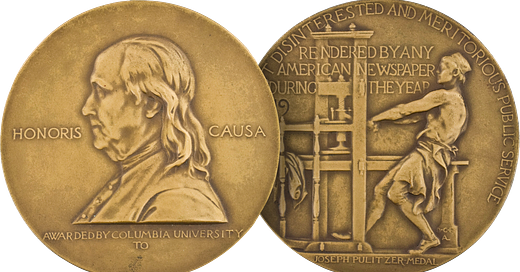A cynical, mercenary, demagogic press will produce in time a people as base as itself.
– Joseph Pulitzer
It’s a tribute to journalists’ vanity and self-mythologization that the Pulitzer Prizes still retain some aura of gravitas. Having chronicled them extensively for Columbia Journalism School, I think of the prizes more like Oprah’s Book Club or the Grammys—a mark of bland establishmentarian respectability, and likely sign that the product is a rubber stamp.
Since 1917, the Pulitzers have been a reliable barometer of upscale conventional wisdom—not necessarily a bad thing for decades, when despite some notable missteps they really did tend to honor terrific talent. My hometown paper, the St. Louis Post-Dispatch, had been established by Joseph Pulitzer himself before he’d left for New York—and the prizes, especially those we’d won over the years, were held in hushed reverence and awe. The Pulitzer family remained prominent local philanthropists, especially of the arts, and having such demigods around was a source of civic pride.
But that was the era of mass media competing for a mainstream—unimaginable today with algorithms pushing specially tailored red meat directly to atomized consumers. In the digital age, the prizes have shrunk to a particularly pompous niche still coasting on the old prestige.
(I once asked Sig Gissler, the longtime prize administrator, why we hadn’t retracted the infamous award to Walter Duranty, the New York Times correspondent whose dishonest dispatches from the Soviet Union were critics’ go-to talking point. No way we’d give the right wing that satisfaction, he told me.)
As a free agent now I can’t emphasize enough how empty the prizes had become even a decade ago—Thomas Friedman sauntering from car service up to Pulitzer Hall’s famed World Room—and that was before the bottom really fell out. They were a sad cartoon well ahead of Donald Trump descending that golden escalator.
For years I attended prize luncheons at Columbia’s Low Library as reporter and warm body filling photo ops in exchange for rubbery chicken with mashed potatoes and wine. University President Lee C. Bollinger would boast of his First Amendment scholarship and landmark Supreme Court case, followed by awardees waxing poetic about their own historic significance.
Whether the beat was race, refugees or the environment, the prescription was almost always the same: more expert administrators and many more grants and subsidies for selfless global truthtellers like them, along with doing more to suppress disinformation from the bad guys. Accordingly, the arts prizes went largely to poets, playwrights, et al peddling variations on the same theme.
Even fresh out of public broadcasting the scene felt awfully stodgy, pandering to aged donors still fighting the last war. The intentions were good, the gestalt exhausted—but the brand enduring.
My first job at Columbia had been curating the Journalism School’s centennial, massaging the Pulitzer legacy for maximum fundraising. Step one was reading up on our founding benefactor to untangle the motivations behind his big bequest. Officially it was that the grand old man had pangs of conscience about his yellow journalism vs. William Randolph Hearst amid the Spanish-American War, but there was also good reason he’d been the villain in Newsies.
Joseph Pulitzer had been an imperious neurotic, ahead of his time but cruel, greedy, vengeful and vain. It was impossible to determine whether his philanthropy came more from genuine remorse or an attempt to rehabilitate the family name in high society.
And so too it’s hard to say how much today’s vacuous prizes sanctifying contemporary yellow journalism truly betray Pulitzer’s intentions. If one takes the old plaques seriously, or the promotional hosannas I put together, recent awardees have tended toward the appalling. But if the prizes are mainly a moving target for status striving they’re doing about as well as ever.
Regardless, it’s past time any residual regard for the Pulitzer Prizes evaporate. After a century plus they’re as captured and corrupt an institution as any—not that they don’t still recognize some legit reporting, but that they’re no longer grounded in a conception of the common good that most Americans of either party would recognize. Instead they’ve become shiny talismans of shopworn narratives from Davos and the Hamptons, such that you hardly have to read the awardees to know what line they’re selling.
Speaking as a former insider of sorts, most of what the prizes should be celebrating now comes from outside the system, under constant threat of throttling and censorship. There isn’t really any high-profile award to replace the Pulitzers and probably shouldn’t be—that kind of pomp and circumstance pretty well guarantees decline.
Before journalism was overtaken by idealists from the finest schools, it had been a working-class industry of hard-bitten characters drinking with cops and criminals alike for the whole lurid story. Then for a time there was some blend between generations, delivering more and more pablum but with enough pungent context to remain intelligible. That balance finally broke down by the later 2000s amid online polarization, deaths of the old guard, and the Obama campaign.
But the narrower the narrative from the great and good, the hungrier the demos for grittier truths—thus the decline of the supposed mainstream and explosion of alternative media. No longer are there totemic authorities to accept uncritically, which represents real progress: no individual or institution deserves such obeisance, now more than ever.
That said, winning a Pulitzer is still no mark of shame, just a red flag for readers to doublecheck awardees’ ideologies and incentives. In these days of devolving standards, conscientious consumers are about all that’s left between journalism and propaganda—and the customer is more often right than whatever the establishment is flogging.
Was pleased to be reprinted in the New York Post.
Next: Magical Sorkinism



Who is doing good journalism, then? Who is questioning the official narrative? Who is trying to get at the truth, no matter who murky, or unsatisfying the answers might be?
Funny. I used the same epigraph about 15 months ago.
https://xpcallahan.substack.com/p/3222023?utm_source=publication-search